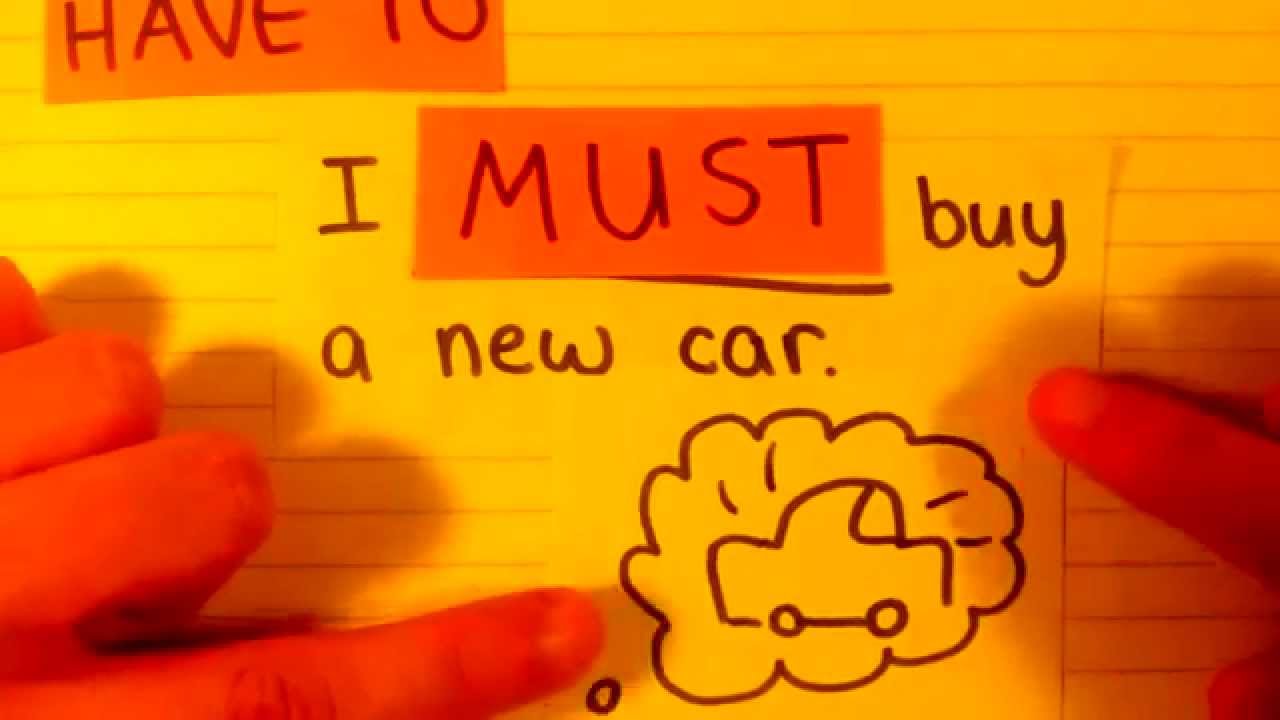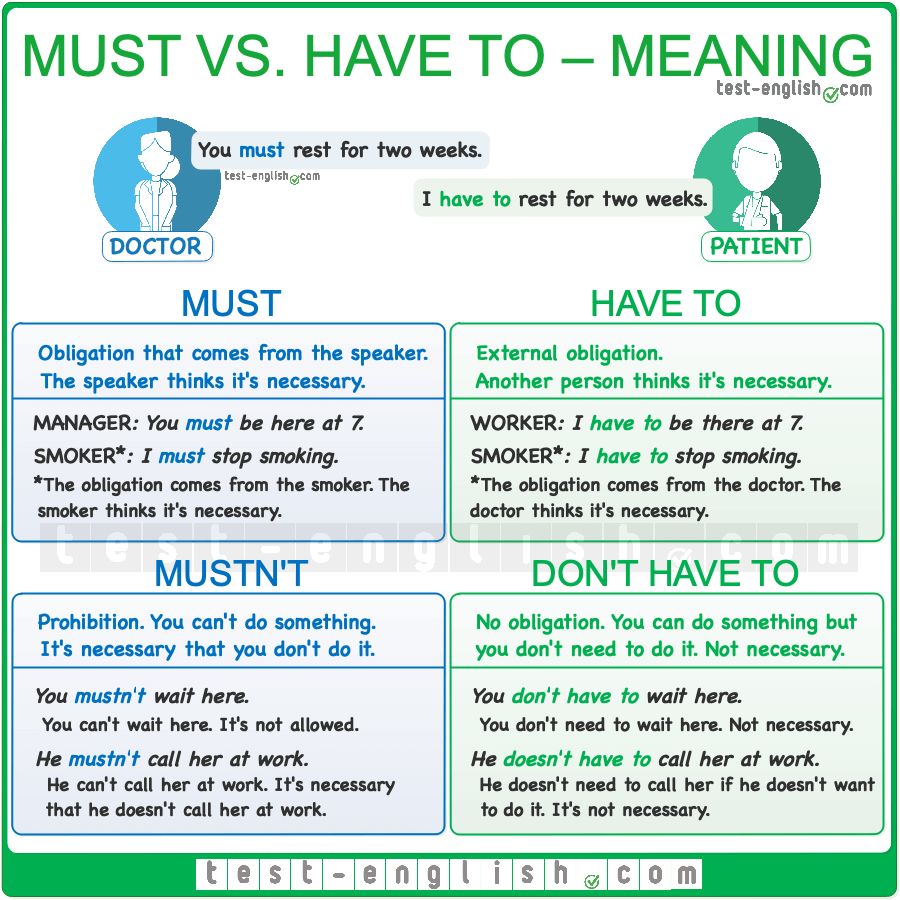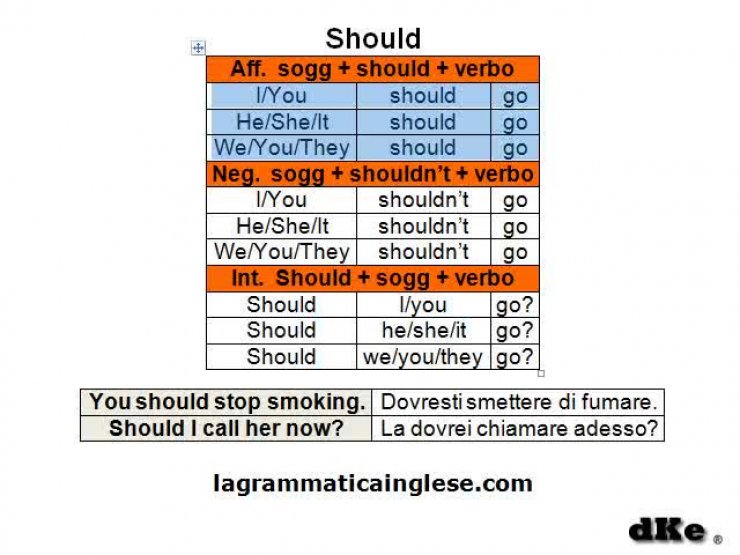
OBLIGATIONMust/Have toMustn't/Don't have to
MUST
Solitamente 'to have to' e 'must' hanno lo stesso significato e implicano un dovere.
Nella maggior parte dei casi must indica un obbligo impellente, per esempio:
I really must go, my dad is going to get mad at me. (Devo davvero andare, mio padre si arrabbierà con me)
Must è semplice da utilizzare visto che è caratterizzato solamente dal Simple Present nella coniugazione dell'indicativo.
Must è un verbo modale e come tutti i verbi di questa tipologia segue delle regole ferree per la costruzione delle frasi e vanta delle caratteristiche specifiche:
- Si tratta di un verbo invariabile
- Non sono necessari ausiliari per creare le fasi negative e interrogative
- Dopo must si utilizzano verbi all'infinito (senza il 'to')
- Nella frase non viene mai seguito dal complemento oggetto
We must do it! (lo dobbiamo fare)

Dovere in inglese: must, to have to, shall, should
- È possibile scegliere 'must' per esprimere la certezza che qualcosa sia vero. Per eseguire una deduzione logica basata su fatti o ragioni evidenti.
- He must be coming, he just called me. (Sicuramente sta per arrivare, mi ha appena chiamato)
- È inoltre possibile utilizzare 'must' per esprimere un impegno o un obbligo. Quando si utilizza 'must' in questa accezione, normalmente significa che alcune circostanze rendono necessario un dovere (normalmente chi parla quasi certamente sarà d'accordo rispetto all'impegno da svolgere).
- They must pay their taxes (Devono pagare le tasse)
- È inoltre possibile utilizzare 'have to' Per esprimere un impegno o un obbligo. Quando si utilizza 'have to' in questa accezione significa che alcune circostanze esterne rendono un'azione necessaria.
- We have to be there at 5pm, otherwise we won't be accepted. (Dobbiamo essere là alle 5pm, altrimenti non saremo accettati)
- Nell'inglese britannico, viene spesso utilizzato 'have got to' con lo stesso significato di 'have to'.
- Si utilizza 'mustn't' per esprimere un forte obbligo riguardo all'impossibilità di compiere un'azione.
- He mustn't eat sugar he is diabetic (Non può mangiare zuccheri, è diabetico)
- Si utilizza 'don't have to' (o nell'inglese britannico 'haven't got to') per indicare che non esiste un obbligo o una necessità.
- We are 17, we don't have to pay to get in. (Abbiamo 17 anni, non dobbiamo pagare per entrare)- NON è NECCESARIO
TO HAVE TO
L'espressione 'to have to' indica un'imposizione proveniente da situazioni esterne.
You have to study harder. (Devi studiare di più)
Visto che è possibile utilizzare 'must' solamente nella forma presente, l'espressione 'to have to' viene di conseguenza utilizzata per le coniugazioni dei restanti tempi,come per esempio: simple past, future simple, present perfect, ecc. Ecco alcuni esempi per chiarirmi le idee:
She has to go back home (Deve tornare a casa)
L'espressione 'to have to'è considerata come un verbo regolare e di conseguenza è invariabile e per la costruzione delle forme negative e interrogative necessita di ausiliari. Ecco due esempi:
You don't have to be there too early (Non devi essere lì troppo presto)
Quando si struttura una frase utilizzando il presente semplice si ha la possibilità di optare per l'espressione 'to have got to' invece di utilizzare la classica espressione 'to have to'. In questo caso si ha la possibilità di creare una proposizione più informale.Per esempio:
You've got to listen the news, what it's going on it's crazy. (Devi sentire le notizie! quello che sta succedendo è pazzesco)
DON'T HAVE TO
Con questa espressione si identifica una decisione che dipende da se stessi, infatti indica qualcosa di non necessario, ma che è possibile fare nel caso lo si desideri.
You don't have to read the book. (Non devi leggere il libro) [Non è necessario che tu lo legga]
MUSTN'T
Utilizzando questa espressione si identifica un divieto o la non concessione di qualcosa. Indica quindi qualcosa che non dovrebbe essere assolutamente fatto.
You mustn't smoke in the house. (Non devi fumare in casa) [Viene imposto un divieto assoluto]
Should
Should è un verbo modale ausiliare. Principalmente si utilizza in questi frangenti:
- Dare consigli o raccomandazioni
- Parlare di un obbligo
- Parlare riguardo a una probabilità o aspettativa
- Esprimere il condizionale
- Sostituire una struttura con il congiuntivo
La struttura base di una proposizione con 'should' è:
soggetto+Verbo ausiliare should+Verbo principale
- Il verbo ausiliare 'should' è invariabile, quindi esiste solo una forma, ossia 'should'.
- Il verbo principale viene utilizzato normalmente nella sua forma base.
How to use: Should/Shouldn't
Should is a modal verb. It is used to make recommendations or give advice. It can also be used to express obligation as well as expectation. When we use should in a sentence, it gives the meaning of "It's a good idea".
Look at these examples:
You should drink water every day. (recommendation)
He should study for the test tomorrow. (advice)
I should buy a gift for the teacher. (obligation)
They should be here by now. (expectation)
Using the modal verb should is easy and fun. You can use any subject, place "should" after the subject but before the base verb. Notice in the four examples, the underlined verbs are in their base forms. That right! You don't have to worry about any special endings on the verbs when you use them with should! Here is the formula:
subject + should + base verb
We can change the subjects in the sentences and you will see that when we use should, the verb remains in the base form.
They should drink water.
I should study for the test tomorrow.
You should buy a gift for the teacher.
He should be here by now.
Should not or Shouldn't just puts the sentence in the negative form. So you are NOT recommending something, NOT advising something, NOT expecting something or "It's not a good idea." For example:
You shouldn't watch a lot of TV. (recommendation/advice)
She should not buy that old car. (recommendation/advice)
He shouldn't arrive in Raleigh until tomorrow. (expectation)
Pronunciation tip: The "l" in should is silent. The "ou" in should sounds like the "oo" in "book", "cook" and "look". Think of this: "shood".
Do you think you should practice more? Below is a link where you can practice using should and shouldn't.
